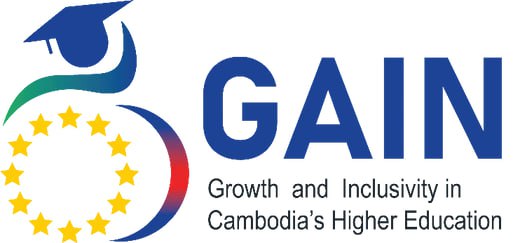
The GAIN: Growth and Inclusivity in Cambodia's Higher Education The GAIN project envisions a systemic shift in the higher education landscape of Cambodia to foster a disability-inclusive, equitable, and diverse academic environment for Persons with Physical Disabilities (PWD). PWDs (mobility, visual, hearing, speech impairments and chronic health conditions) are amongst the groups that are marginalized by the lack of policies, support services, infrastructure and educational capacity in higher education. The project aims to transform Cambodian Higher Education Roadmap 2030 and the ASEAN Enabling Masterplan 2025 guidelines into practices, helping the Government and the Institutions to implement set policies. The objective is to ensure that Cambodian Higher Education Institutions are accessible, inclusive, and equipped to support the diverse needs of PWD. Acknowledging the multifaceted nature of inclusivity challenges, the GAIN project adopts a quadruple helix approach, fostering synergistic collaborations among government entities, academic institutions, civil society organizations, and the private sector. This holistic strategy will encompass a series of co-designed interventions, with a particular emphasis on policy refinement, capacity enhancement, and the establishment of inclusive practices within the Cambodian higher educational landscape. Its objectives are:
- To develop tailored action plans and tools for sustainable application and assessment of government policy. To create customized action plans and tools designed specifically for the sustainable implementation and evaluation of government policies. To support and strengthen the government’s policy objectives efficiently and effectively while promoting transparency and accountability in the policymaking process.
- To systematically strengthen the capabilities of Cambodian HEIs’ staff to foster an inclusive environment for persons with disabilities. This systemic intervention aims to establish and embed comprehensive support and monitoring systems within HEIs, train HEI’s staff implement inclusive financial support programs, and develop educational resources and guidelines tailored for managing inclusivity. The strategy also involves integrating these inclusivity practices into the very core of institutional policies with a commitment to progressively integrate the training into Cambodia’s 2030 National Skills Strategy. This holistic approach ensures a sustainable transformation of HEIs into inclusive educational ecosystems, where inclusivity is not an add-on but an integral component of their operational and educational frameworks.
- To systematically bridge the gap between higher education and the labor market for persons with disabilities in Cambodia. This involves developing sustainable partnerships between Higher Education Institutions and industry sectors, fostering environments conducive to inclusive employment. Key initiatives include organizing inclusive job fairs and industry-academia discussions, alongside establishing comprehensive career support and job placement services tailored for PWD students.
- To cultivate a deeply integrated, cyclic and systemic relationship between Cambodian Higher Education Institutions, persons with disabilities, and the wider community. This objective involves establishing a network of collaborative and supportive interactions that transcend traditional academic boundaries, fostering a culture of inclusivity and understanding within the broader society. Additionally, GAIN aims to promote awareness and advocacy campaigns to shift societal perceptions and attitudes towards PWD, thereby facilitating a more inclusive environment not only within educational settings but also in the larger community context.

